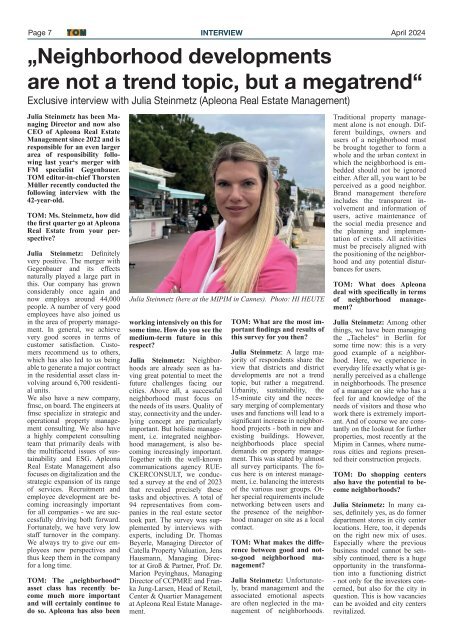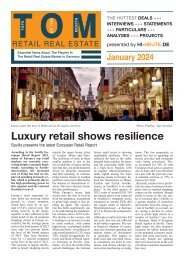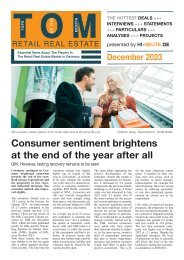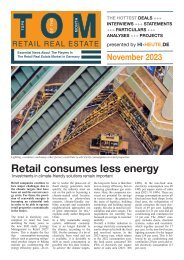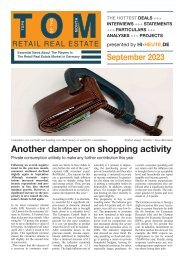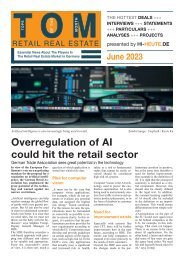TOM 04 2024
Create successful ePaper yourself
Turn your PDF publications into a flip-book with our unique Google optimized e-Paper software.
Page 7 T O M<br />
INTERVIEW April <strong>2024</strong><br />
„Neighborhood developments<br />
are not a trend topic, but a megatrend“<br />
Exclusive interview with Julia Steinmetz (Apleona Real Estate Management)<br />
Julia Steinmetz has been Managing<br />
Director and now also<br />
CEO of Apleona Real Estate<br />
Management since 2022 and is<br />
responsible for an even larger<br />
area of responsibility following<br />
last year‘s merger with<br />
FM specialist Gegenbauer.<br />
<strong>TOM</strong> editor-in-chief Thorsten<br />
Müller recently conducted the<br />
following interview with the<br />
42-year-old.<br />
<strong>TOM</strong>: Ms. Steinmetz, how did<br />
the first quarter go at Apleona<br />
Real Estate from your perspective?<br />
Julia Steinmetz: Definitely<br />
very positive. The merger with<br />
Gegenbauer and its effects<br />
naturally played a large part in<br />
this. Our company has grown<br />
considerably once again and<br />
now employs around 44,000<br />
people. A number of very good<br />
employees have also joined us<br />
in the area of property management.<br />
In general, we achieve<br />
very good scores in terms of<br />
customer satisfaction. Customers<br />
recommend us to others,<br />
which has also led to us being<br />
able to generate a major contract<br />
in the residential asset class involving<br />
around 6,700 residential<br />
units.<br />
We also have a new company,<br />
fmsc, on board. The engineers at<br />
fmsc specialize in strategic and<br />
operational property management<br />
consulting. We also have<br />
a highly competent consulting<br />
team that primarily deals with<br />
the multifaceted issues of sustainability<br />
and ESG. Apleona<br />
Real Estate Management also<br />
focuses on digitalization and the<br />
strategic expansion of its range<br />
of services. Recruitment and<br />
employee development are becoming<br />
increasingly important<br />
for all companies - we are successfully<br />
driving both forward.<br />
Fortunately, we have very low<br />
staff turnover in the company.<br />
We always try to give our employees<br />
new perspectives and<br />
thus keep them in the company<br />
for a long time.<br />
<strong>TOM</strong>: The „neighborhood“<br />
asset class has recently become<br />
much more important<br />
and will certainly continue to<br />
do so. Apleona has also been<br />
Julia Steinmetz (here at the MIPIM in Cannes). Photo: HI HEUTE<br />
working intensively on this for<br />
some time. How do you see the<br />
medium-term future in this<br />
respect?<br />
Julia Steinmetz: Neighborhoods<br />
are already seen as having<br />
great potential to meet the<br />
future challenges facing our<br />
cities. Above all, a successful<br />
neighborhood must focus on<br />
the needs of its users. Quality of<br />
stay, connectivity and the underlying<br />
concept are particularly<br />
important. But holistic management,<br />
i.e. integrated neighborhood<br />
management, is also becoming<br />
increasingly important.<br />
Together with the well-known<br />
communications agency RUE-<br />
CKERCONSULT, we conducted<br />
a survey at the end of 2023<br />
that revealed precisely these<br />
tasks and objectives. A total of<br />
94 representatives from companies<br />
in the real estate sector<br />
took part. The survey was supplemented<br />
by interviews with<br />
experts, including Dr. Thomas<br />
Beyerle, Managing Director of<br />
Catella Property Valuation, Jens<br />
Hausmann, Managing Director<br />
at Groß & Partner, Prof. Dr.<br />
Marion Peyinghaus, Managing<br />
Director of CCPMRE and Franka<br />
Jung-Larsen, Head of Retail,<br />
Center & Quartier Management<br />
at Apleona Real Estate Management.<br />
<strong>TOM</strong>: What are the most important<br />
findings and results of<br />
this survey for you then?<br />
Julia Steinmetz: A large majority<br />
of respondents share the<br />
view that districts and district<br />
developments are not a trend<br />
topic, but rather a megatrend.<br />
Urbanity, sustainability, the<br />
15-minute city and the necessary<br />
merging of complementary<br />
uses and functions will lead to a<br />
significant increase in neighborhood<br />
projects - both in new and<br />
existing buildings. However,<br />
neighborhoods place special<br />
demands on property management.<br />
This was stated by almost<br />
all survey participants. The focus<br />
here is on interest management,<br />
i.e. balancing the interests<br />
of the various user groups. Other<br />
special requirements include<br />
networking between users and<br />
the presence of the neighborhood<br />
manager on site as a local<br />
contact.<br />
<strong>TOM</strong>: What makes the difference<br />
between good and notso-good<br />
neighborhood management?<br />
Julia Steinmetz: Unfortunately,<br />
brand management and the<br />
associated emotional aspects<br />
are often neglected in the management<br />
of neighborhoods.<br />
Traditional property management<br />
alone is not enough. Different<br />
buildings, owners and<br />
users of a neighborhood must<br />
be brought together to form a<br />
whole and the urban context in<br />
which the neighborhood is embedded<br />
should not be ignored<br />
either. After all, you want to be<br />
perceived as a good neighbor.<br />
Brand management therefore<br />
includes the transparent involvement<br />
and information of<br />
users, active maintenance of<br />
the social media presence and<br />
the planning and implementation<br />
of events. All activities<br />
must be precisely aligned with<br />
the positioning of the neighborhood<br />
and any potential disturbances<br />
for users.<br />
<strong>TOM</strong>: What does Apleona<br />
deal with specifically in terms<br />
of neighborhood management?<br />
Julia Steinmetz: Among other<br />
things, we have been managing<br />
the „Tacheles“ in Berlin for<br />
some time now: this is a very<br />
good example of a neighborhood.<br />
Here, we experience in<br />
everyday life exactly what is generally<br />
perceived as a challenge<br />
in neighborhoods. The presence<br />
of a manager on site who has a<br />
feel for and knowledge of the<br />
needs of visitors and those who<br />
work there is extremely important.<br />
And of course we are constantly<br />
on the lookout for further<br />
properties, most recently at the<br />
Mipim in Cannes, where numerous<br />
cities and regions presented<br />
their construction projects.<br />
<strong>TOM</strong>: Do shopping centers<br />
also have the potential to become<br />
neighborhoods?<br />
Julia Steinmetz: In many cases,<br />
definitely yes, as do former<br />
department stores in city center<br />
locations. Here, too, it depends<br />
on the right new mix of uses.<br />
Especially where the previous<br />
business model cannot be sensibly<br />
continued, there is a huge<br />
opportunity in the transformation<br />
into a functioning district<br />
- not only for the investors concerned,<br />
but also for the city in<br />
question. This is how vacancies<br />
can be avoided and city centers<br />
revitalized.


